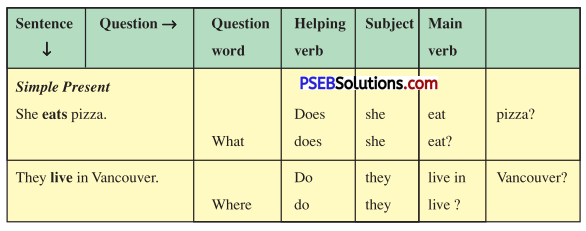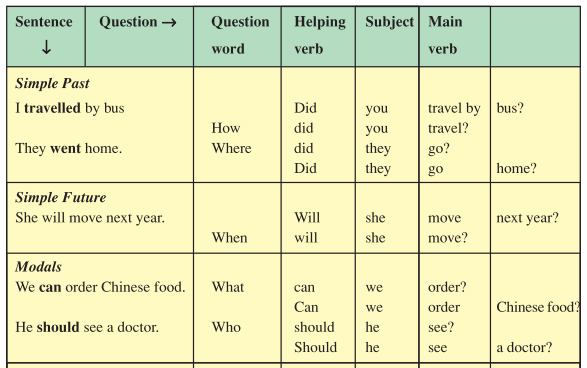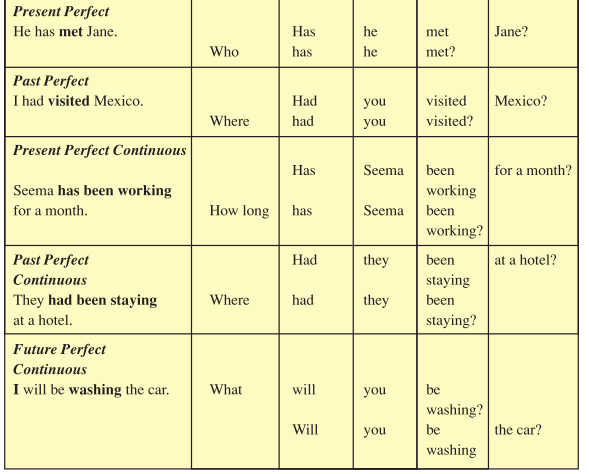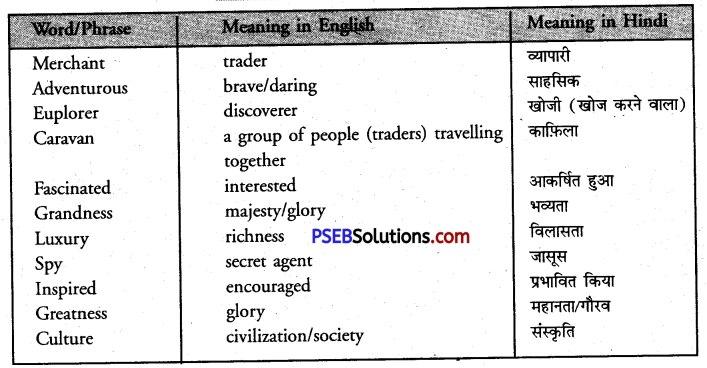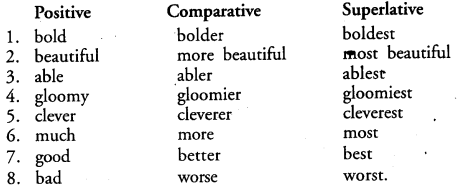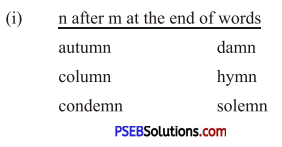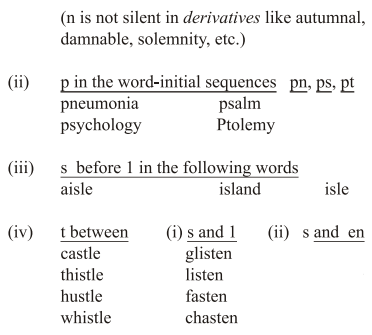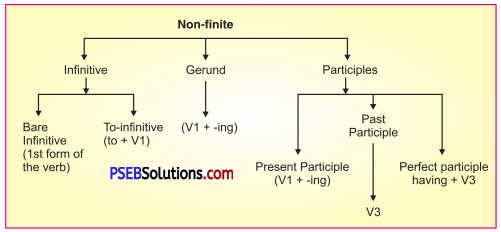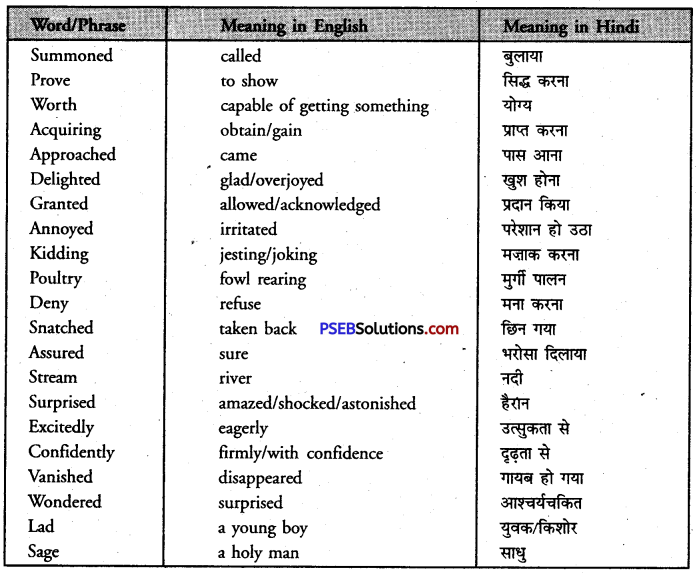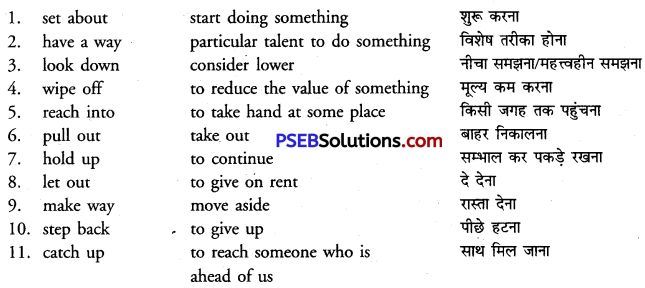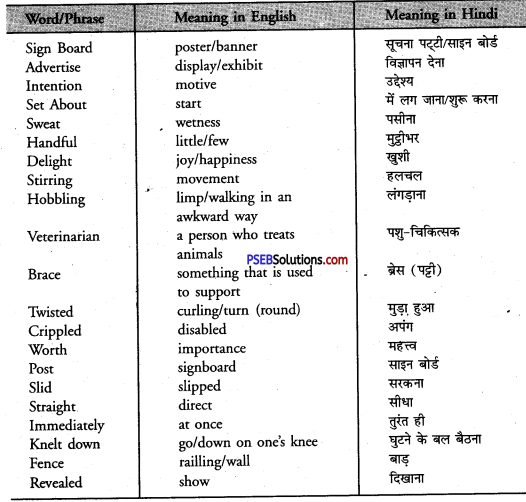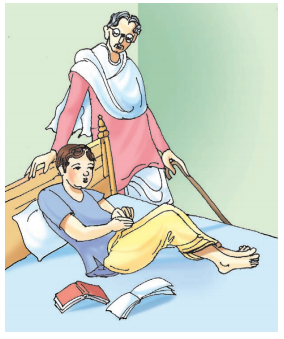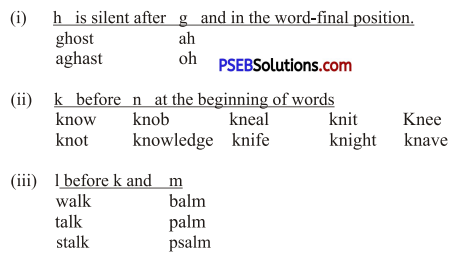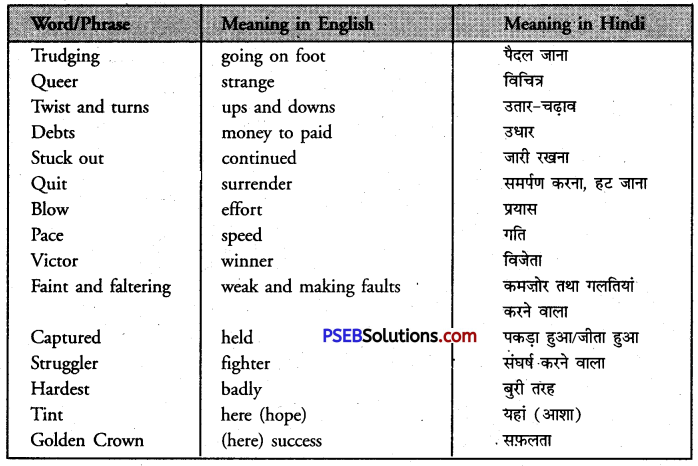Punjab State Board PSEB 9th Class English Book Solutions English Main Course Book Chapter 4 Journey by Night Textbook Exercise Questions and Answers.
Class 9th English Main Course Book Chapter 4 Journey by Night Question Answers
Journey by Night Class 9 Questions and Answers
Answer the following questions in brief:
Question 1.
Who was Sher Singh Bahadur ?
(शेर सिंह बहादुर कौन था ?)
Answer:
He was a famous hunter. He lived in Laldwani village. His name was Sher Singh. The word ‘Bahadur’ was added to his name like a medal.
वह एक प्रसिद्ध शिकारी था। वह लालदवानी गांव में रहता था। उसका नाम शेर सिंह था। ‘बहादुर’ शब्द उसके नाम के साथ एक तमगे की भांति जुड़ गया था।
![]()
Question 2.
Where did he get the big scar from?
(उसे घाव का बड़ा निशान कहां से प्राप्त हुआ ?)
Answer:
Once Sher Singh Bahadur tried to save a comrade from a tiger. The tiger attacked Sher Singh Bahadur also, and tore his flesh to the bone. Thus Sher Singh Bahadur got
एक बार शेर सिंह बहादुर ने एक साथी को एक बाघ से बचाने का यत्न किया। बाघ ने शेर सिंह बहादुर पर भी आक्रमण कर दिया और उसकी चमड़ी को हड्डी तक फाड़ दिया। इस प्रकार शेर सिंह बहादुर की खोपड़ी, उसकी पीठ और कन्धे पर घाव का एक बड़ा निशान बन गया।
Question 3.
Why were there no men in the village?
(गांव में कोई आदमी क्यों नहीं था ?)
Answer:
All men of the village had gone to the jungle with a hunting party. That was why there were no men in the village.
गांव के सभी आदमी एक शिकारी-टोली के साथ जंगल गए हुए थे। इसी कारण से गांव में कोई आदमी नहीं था।
Question 4.
What had happened to the other children ?
(अन्य बच्चों को क्या हुआ था ?)
Answer:
They all had died. It was cholera and influenza that had taken their lives.
वे सभी मर गए थे। यह हैज़ा और फ़्लू था जिसने उनकी जाने ले ली थीं।
Question 5.
Why could Sher Singh’s mother not take her son to the hospital ?
(शेर सिंह की मां अपने बेटे को अस्पताल क्यों नहीं ले जा सकती थी ?)
Answer:
Sher Singh’s father had gone to the jungle with a hunting party. His mother could not leave home. She had to look after the cattle and attend to the field. So she could not take her son to the hospital.
शेर सिंह का पिता शिकार करने वाली एक टोली के साथ जंगल गया हुआ था। उसकी माता घर छोड़कर नहीं जा सकती थी। उसे पशुओं की देखभाल करनी थी और खेत का भी ध्यान रखना था। इसलिए वह अपने बेटे को अस्पताल नहीं ले जा सकती थी।
![]()
Question 6.
How did Sher Singh carry his brother ?
(शेर सिंह अपने भाई को कैसे उठा कर ले गया ?)
Answer:
Sher Singh’s mother took one of her two saris. She made a sling with it. Sher Singh put it round his forehead and down his back. It was in this sling that he carried his brother.
शेर सिंह की मां ने अपनी दो साड़ियों में से एक साड़ी ली। उसने इसके साथ एक गलपट्टी बनाई। शेर सिंह ने इसे अपने माथे के साथ टिका कर अपनी पीठ की तरफ लटका लिया। इसी झूले में वह अपने भाई को उठा कर ले गया।
Question 7.
What happened at the first river ?
(पहली नदी पर क्या हुआ ?)
Answer:
The first river was very shallow. Sher Singh was able to cross it without much difficulty. He had to go very slowly because the stones were slimy.
पहली नदी बहुत कम गहरी थी। शेर सिंह इसे अधिक कठिनाई के बिना ही पार करने में सफल हो गया। उसे बहुत धीरे-धीरे जाना पड़ा क्योंकि पत्थर बहुत फिसलन वाले थे।
Question 8.
What was the condition of the second river ? What had happened to the bridge ?
(दूसरी नदी की क्या दशा थी ? पुल को क्या हुआ था ?)
Answer:
The second river was in flood. It had a bamboo bridge. But now the bridge was gone. It lay broken in the flooded river.
दूसरी नदी में बाढ़ आई हुई थी। इस पर बांस का बना एक पुल था। किन्तु अब पुल जा चुका था। यह बाढ़ आई नदी में टूटा पड़ा था।
Question 9.
How did Sher Singh cross the second river ?
(शेर सिंह ने दूसरी नदी कैसे पार की ?)
Answer:
Sher Singh made a rope from grass. He tied it round himself and his brother. Then he moved forward inch by inch through the flooded river. It was only his courage that helped him to cross the river.
शेर सिंह ने घास से एक रस्सा बनाया। उसने इसे अपने तथा अपने भाई के गिर्द बांध लिया। फिर वह बाढ़ वाली नदी में एक-एक इंच करके आगे बढ़ने लगा। यह केवल उसका साहस ही था जिसने नदी को पार करने में उसकी सहायता की।
![]()
Question 10.
How did they reach the hospital after crossing the rivers ?
(नदियों को पार करने के बाद वे अस्पताल कैसे पहुंचे ?)
Answer:
Sher Singh was too tired to walk. He went crawling some distance. Then he did not know what happened. After that, he only knew he and his brother were in a bullock cart and then a truck. Thus they reached the hospital.
शेर सिंह इतना थक गया था कि चल नहीं सकता था। वह कुछ दूरी तक रेंगते हुए चलता गया। फिर उसे पता न रहा कि क्या हुआ। उसके बाद केवल उसे इतना ही पता चला कि वह और उसका भाई एक बैलगाड़ी में थे और फिर एक ट्रक में। इस तरह वे अस्पताल पहुंच गए।
Question 11.
What did the doctor say?
(डाक्टर ने क्या कहा ?)
Answer:
The doctor called Sher Singh a brave boy. He called him Sher Singh Bahadur. He said, “Your brother will live. Come and see.”
डाक्टर ने शेर सिंह को एक वीर लड़का कहा। उसने उसे शेर सिंह बहादुर कह कर बुलाया। उसने कहा, “तुम्हारा भाई जीवित रहेगा। आओ और देखो।”
Answer the following questions in your own words:
Question 1.
Explain the circumstances in which Kunwar was carried to the hospital.
(उन परिस्थितियों का वर्णन कीजिए जिनमें कंवर को अस्पताल ले जाया गया था।)
Answer:
Kunwar had severe pain in his stomach. The pain was getting worse and worse. So the boy had to be taken to hospital. Sher Singh’s father was not at home. There was no other man also in the village. His mother, too, could not leave home. Thus there was none but Sher Singh to carry Kunwar to the hospital. And he did it like a hero.
कंवर के पेट में सख्त दर्द था। पीड़ा अति भयंकर होती जा रही थी। इसलिए लड़के को अस्पताल ले जाना पड़ना था। शेर सिंह का पिता घर पर नहीं था। गांव में कोई दूसरा पुरुष भी नहीं था। उसकी मां भी घर छोड़ कर नहीं जा सकती थी। इस प्रकार कंवर को अस्पताल ले जाने के लिए वहां शेर सिंह के अतिरिक्त और कोई नहीं था। तथा उसने यह काम एक योद्धा की भांति किया।
Question 2.
Write a few lines about the character-sketch of Sher Singh.
(शेर सिंह के चरित्र-चित्रण के बारे में कुछ पंक्तियां लिखें।)
Answer:
Sher Singh was only twelve but had the courage of a lion. He carried his sick brother to the Kalaghat hospital. It was eighty kilometres from the village. Sher Singh had to face many dangers on the way. But he did not lose courage. At last, he was able to reach the Kalaghat hospital. He saved the life of his brother.
शेर सिंह केवल बारह वर्ष का था किन्तु उसमें एक शेर जैसा हौसला था। वह अपने बीमार भाई को कालाघाट अस्पताल तक उठा कर ले गया। यह गांव से अस्सी किलोमीटर की दूरी पर था। शेर सिंह को रास्ते में बहुत से खतरों का सामना करना पड़ा। किन्तु उसने हौसला न छोड़ा। अन्त में वह कालाघाट अस्पताल पहुंचने में सफल हो गया। उसने अपने भाई का जीवन बचा लिया।
![]()
Question 3.
Describe Sher Singh’s father.
Answer:
Sher Singh’s father was a famous hunter. He was very brave and fearless. He was known far and wide. The word ‘Bahadur’ was added to his name like a medal. Once he tried to save a comrade from a tiger. The tiger gave him a big scar on his skull, back and shoulder.
शेर सिंह का पिता एक प्रसिद्ध शिकारी था। वह बहुत वीर तथा निडर था। वह दूर-दूर तक प्रसिद्ध था। उसके नाम के साथ ‘बहादुर’ शब्द एक तमगे की भांति जुड़ गया था। एक बार उसने एक साथी को एक बाघ से बचाने की कोशिश की। बाघ ने उसे उसकी खोपड़ी, पीठ और कन्धे पर एक बड़ा घाव का निशानं दे दिया।
Textual Vocabulary & Grammar
Identify and match the sounds made by the animals under column A to the sounds in column B :
1. bees — buzz
2. birds — chirp
3 cats — mew
4. cocks — crow
5. cows — low or moo
6. dogs — bark
7. donkeys — bray
8. frogs — croak
9. horses — neigh
10. lions — roar
11. owls — hoot
12. snakes — hiss
13. wolves — howl
Add the correct suffixes to the words given in the brackets, choosing from the list given below :
-dom ; -ness ; -hood.
1. We salute the (wise) and (martyr) of those who fought for the (free) of our country.
2. His journey from (child) to (man) was full of struggle.
3. (Good) and (sweet) of behaviour are of no avail if one lacks in (bold) of character.
4. (Parent) brings responsibilities.
5. He lost his (king) to the enemy.
6. (Happy) is a state of mind.
Answer:
1. wisdom, martyrdom, freedom
2. childhood, manhood
3. Goodness, sweetness, boldness
4. Parenthood
5. kingdom
6. Happiness.
Fill in the following blanks with the words given in the box :
cursed; passed by; written; remove; middle; stone; lazy; attempted; lesson; road ; stumbled
Once upon a time there lived a king who believed in hard work. But he was distressed because his people had become lazy. One day, to teach them a lesson, he put a big stone in the middle of the road. One of his ministers passed by in his carriage. He did not even ask his servants to remove the stone. Then some merchants came. They saw the stone and cursed the government for this and went away. Many people came and went, but no one attempted to remove it. A child was going to school. He stumbled and fell down. He got up and pushed the stone away from the road. There lay a box full of gold under it, on which was written : “This gold is meant for the one who removes the stone.”
Fill in the blanks with the correct verb forms of the italicized words :
1. It is an old belief; you may …………….. it or not. (belief)
2. Why don’t you …………….. your dog properly ? (food)
3. Researches have shown that plants also ……………. . (breath)
4. Don’t let the liquid ……………… (drop)
5. The cattle …….. ……. on these fields. (grass)
6. Pray to God to …………….. all. (bliss)
7. You can ……………… your dress. (choice)
8. …. and let live. (life) .
9. The lawyer tried his best to ……………. him guilty. (proof)
10. On every festival day, he went to the village to ……………… the poor. (cloth)
Answer:
1. believe
2. feed
3. breathe
4. drip
5. graze
6. bless
7. choose
8. Live
9. prove
10. clothe.
![]()
Correct the following sentences :
1. The football match ended to a draw.
2. Our Principal is a honest lady.
3. He is senior than me.
4. She is a M.A., B.Ed.
5. Mr. Sharma is a honourable man.
6. He is an European.
7. He is an one-eyed man.
8. I read Tribune every day.
9. This is an useful article.
10. A lion is the king of forest.
Answer:
1. The football match ended in a draw.
2. Our Principal is an honest lady.
3. He is senior to me.
4. She is an M.A., B.Ed.
5. Mr. Sharma is an honourable man.
6. He is a European.
7. He is a one-eyed man.
8. I read The Tribune every day.
9. This is a useful article.
10. The lion is the king of the forest.
Fill in the blanks with correct Prepositions :
1. All mothers look …………….. their children.
2. Do not look ……………. upon the poor.
3. My teacher asked me to look ……… the word in the dictionary.
4. The officer promised to look …. the matter.
5. Shiela looks ………………. him as her son.
6. Prices are looking …………
Answer:
1. after
2. down
3. up
4. into
5. upon
6. up.
Pronunciation Practice
Say the following words aloud:
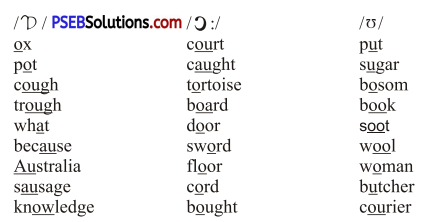
Creative Writing and Extended Reading
1. Read sorne books on the stories of brave children who received awards for bravery on the Republic Day. Discuss these with your friends.
2. Imagine that you are Sher Singh. What would you do in a similar situation?
3. Write a paragraph on : A Village without a Hospital.
4. Have you ever performed any great act of social service in your life? Describe it in a few lines.
Objective Type Questions
Answer the following in one word / phrase / sentence :
Question 1.
Where did Sher Singh live ?
Answer:
He lived in a hilly village.
Question 2.
Who is the writer of the story, ‘Journey by Night ?
Answer:
Norah Burke.
Question 3.
How old was Sher Singh ?
Answer:
He was about 12 years old.
Question 4.
What was Sher Singh’s father known as ?
Answer:
He was known as ‘Sher Singh Bahadur’.
Question 5.
What was Sher Singh’s father an expert in ?
Answer:
In hunting wild animals.
Question 6.
What seemed trophies to Sher Singh’s father?
Answer:
The wound marks on his body.
Question 7.
Who was Kunwar ?
Answer:
The younger brother of Sher Singh.
![]()
Question 8.
How far was the hospital where Kunwar was to be taken?
Answer:
About 80 kilometres away.
Question 9.
Who was to take Kunwar to the hospital ?
Answer:
Sher Singh, his elder brother.
Question 10.
Did Sher Singh’s efforts bear fruit ?
Answer:
Yes, his brother’s life was saved.
Complete the following :
1. Kunwar was Sher Singh’s ………..
2. Sher Singh’s father was an …………………. in hunting ……….
3. Sher Singh’s father went on a ………….. expedition.
4. Sher Singh carried Kunwar on his back to the
5. Sher Singh had to save himself from ……………… on the way.
6. Kunwar would ……………… but for the efforts made by Sher Singh.
Answer:
1. younger brother
2. expert, wild animals
3. hunting
4. hospital
5. wild beasts
6. have died.
Write True or False, against each statement :
1. Kunwar was the elder brother of Sher Singh.
2. Sher Singh was an expert Shikari.
3. Sher Singh carried his younger brother all the way to the hospital.
4. The hospital was in the nearest town.
5. The entire distance to the hospital was frequented by wild beasts.
6. In spite of his efforts, Sher Singh could not save his younger brother.
Answer:
1. False
2. False
3. True
4. False
5. True
6. False.
Choose the correct option for each of the following:
Question 1.
Sher Singh lived in ………………….
(a) a jungle
(b) a big town
(c) an ashrama
(d) a hilly village.
Answer:
(d) a hilly village.
Question 2.
Sher Singh and Kunwar were …………..
(a) cousins
(b) classmates
(c) real brothers
(d) fast, friends.
Answer:
(c) real brothers
Question 3.
Kunwar had been struck with ………………..
(a) a severe headache
(b) flu
(c) a severe pain in the stomach pain in the stomach
(d) malaria.
Answer:
(c) a severe pain in the stomach pain in the stomach
Question 4.
Sher Singh proved himself a …….
(a) brave boy
(b) responsible person
(c) loving brother
(d) all the above.
Answer:
(d) all the above.
![]()
Use Of Textual Words / Phrases
1. Several – There are several places of worship on the banks of the Holy Ganges.
2. Resort – Gandhiji took to fasting as a last resort.
3. Doomed – He is doomed to die if he does not give up drinking.
4. Expedition – Army men went on the Himalayan expedition.
5. Scar – Even the scar on her face did not spoil her beauty.
6. Trodden – The child got trodden under the feet of the huge animal.
7. Glazed – The school compound had a border of glazed tiles.
8. Decimated – The hurricane decimated the national property.
9. Mauled – The mountain bear mauled her face.
10. Cliff – We went on a picnic by the side of a cliff.
11. Jostle – The rowdy boys jostled in the crowd of ladies.
12. Squeal – The children in the train got afraid of the squeal of the engine.
13. Snort – We snorted with laughter on hearing his joke.
14. Plod – The old man plodded along the hilly path.
15. Delirious – The drunkard ran into a delirious state of mind.
16. Maelstrom- All the fishermen along with their boats were caught in the maelstrom.
17. Deluge – People are still talking about the Mumbai deluge.
18. Stumble – He stumbled over a stone and fell down.
19. Poach – Poaching of animals is banned in this state.
Journey by Night Summary in English
Journey by Night Introduction:
It is a story of rare courage shown by a 12-year-old boy. His name was Sher Singh. His younger brother had fallen ill. His father was not at home. His mother was not in a position to leave home. The city hospital was many miles away. So, Sher Singh carried his little brother on his back and set out for the city. He had to pass through a hilly area that was full of many dangers. A thick forest and two hilly rivers fell on the way. But Sher Singh braved all these dangers with great courage. The only thought in his mind was to reach the city hospital as soon as possible. At last, Sher Singh was able to reach the hospital with his brother. Everybody was surprised to hear the story of his great courage. The doctor at once gave first aid to Sher Singh’s brother. The doctor said that the boy was out of danger. Sher Singh was really a Sher, a lion. He had saved the life of his brother at a great risk to his own life.
Journey by Night Summary in English:
Sher Singh lived in a hilly village. He was about twelve years old. His father was known far and wide as Sher Singh Bahadur since he was a very brave and famous shikari. The father was an experienced hunter. He usually went out to help the hunting expeditions into the jungle and remained away from home for many days together. He was an expert in hunting wild animals. His body bore a number of wound-marks, which he took as the trophies of his various fights with several dangerous jungle beasts.
Sher Singh had a little brother named Kunwar. He was several years younger to Sher Singh. The two brothers lived with their parents in Laldwani village near a jungle. One day, Sher Singh Bahadur had gone with a hunting expedition. All the men of Laldwani village had also gone as beaters (men employed to drive animals towards those waiting to shoot or photograph them). In his father’s absence, the little boy, Kunwar, fell seriously ill. He had a severe pain in the stomach. His condition was getting from bad to worse.
The child did not respond to home remedies. The helpless mother said that Kunwar must be taken to hospital at Kalaghat, which was 80 kilometres away. Seeing the fear of death in Kunwar’s eyes, Sher Singh at once decided to do the job of taking his brother to the Kalaghat hospital. His mother made a sling with one of her two saris. She put it around Sher Singh’s forehead and down his back. She then put the sick Kunwar into the sling.
It was evening when Sher Singh set off on his difficult and dangerous journey to Kalaghat. Soon it was night and the moon appeared in the sky. Sher Singh continued to walk on and on. He saw the marks of a bear’s paw in the dust. It made him quicken his steps. Presently, he climbed on to a cliff above a river bed. He felt tired, and put his sick brother down. All of a sudden, he heard the squeal of elephants. Luckily, the elephants moved on and disappeared into the forest. Relieved of this fresh fear, Sher Singh got ready to restart his journey. However, his difficulties were not yet over.
Sher Singh was to cross two rivers on the way. The first river was a shallow one. There was not much water in it. He crossed it easily. But the second river was in flood. It was midnight and the flooded river was making a roaring sound as it flowed. Sher Singh hoped to cross this river by the bridge over it. But when he came closer, he found that the bamboo bridge over this river had broken and was submerged into water.
Sher Singh was disappointed but he kept up his courage. Making a rope of grass, he tied it round his brother and himself. He then entered the river. At first he found it impossible to move. But his firm determination and his courage enabled him to cross the river. He went on slowly but determinedly. He was thoroughly drenched in the ice-cold water.
![]()
At last, Sher Singh reached the metalled road that led to Kalaghat. He got a lift first in a bullock cart, then in a truck. Soon the brave boy was dropped at the hospital of Kalaghat. He put his sick brother under the treatment of the doctor there. After some time, the doctor came out in the verandah. He told Sher Singh that his brother was out of danger. He said that Sher Singh was a brave boy. He took him in so that he could see his sick brother.
Journey by Night Summary in Hindi
Journey by Night Introduction:
यह कहानी एक 12-वर्षीय शेर सिंह नामक लड़के के अद्वितीय साहस की कहानी है। उसका छोटा भाई अति बीमार पड़ गया और उसका पिता घर पर नहीं था। उसकी मां बच्चे को उठा कर अनेक मील दूर शहर के अस्पताल में नहीं ले जा सकती थी। इसलिए शेर सिंह अपने छोटे भाई को अपनी पीठ पर उठा कर शहर के लिए चल दिया। दुर्गम पहाड़ी रास्ते में उसे अनेक खतरों का सामना करना पड़ा। रास्ते में एक जंगल और दो नदियां भी पड़ती थीं। नदियों में बाढ़ आई हुई थी और उन्हें बिना किसी नाव के पार करना असम्भव बात थी।
किन्तु शेर सिंह ने किसी भी खतरे की परवाह न की। उसके मन में एक ही लक्ष्य था कि वह अपने भाई को जल्दी से जल्दी शहर के अस्पताल में पहुंचा सके। जब घोर कष्ट झेलने के बाद शेर सिंह अपने भाई सहित अस्पताल पहुंचा तो उसके साहस को देख कर सभी लोग चकित रह गए। डॉक्टर ने प्राथमिक उपचार के बाद शेर सिंह से कहा कि उसका भाई अब खतरे से बाहर था। शेर सिंह वास्तव में ही एक शेर (अथवा सिंह) की भांति बहादुर था। उसने अपने भाई के जीवन को बचा लिया। यदि वह साहस न दिखलाता तो उसके भाई की अवश्य ही मृत्यु हो जानी थी।
Journey by Night Summary in Hindi:
कहानी का विस्तृत सार बारह-वर्षीय शेर सिंह एक पहाड़ी गांव में रहता था। उसका पिता शेर सिंह बहादुर के नाम से दूर-दूर तक प्रसिद्ध था। वह एक तजुरबेकार साहसी शिकारी था। अनेक शिकारी टोलियां उसकी सहायता लिया करती थीं। इसलिए शेर सिंह बहादुर कई-कई दिनों तक घर से बाहर रहा करता था। उसके शरीर पर अनेक घावों के निशान थे जो एक प्रकार से जंगली जानवरों के साथ उसकी लड़ाई के पदक थे।
शेर सिंह का एक छोटा भाई था जिसका नाम कंवर था। वह शेर सिंह से कई वर्ष छोटा था। दोनों भाई अपने माता-पिता के साथ एक जंगल के समीप लालदवानी नामक गांव में रहते थे। एक दिन शेर सिंह बहादुर एक शिकारी टोली के साथ गया हुआ था। लालदवानी गांव के अन्य पुरुष भी इस टोली की सहायता के लिए उनके साथ गए हुए थे। पिता की अनुपस्थिति में कंवर सख्त बीमार हो गया। उसके पेट में बहुत ज़ोर का दर्द था। घर में कई देसी ढंगों का उस पर प्रयोग किया गया किन्तु उसकी हालत बिगड़ती ही गई।
बेबस होकर मां ने शेर सिंह से कहा कि वह कंवर को कालाघाट के अस्पताल में ले जाए। कालाघाट का यह अस्पताल लालदवानी से अस्सी किलोमीटर की दूरी पर था। शेर सिंह ने जब पीड़ा से भरी हुई अपने भाई की आंखों को देखा तो उसे ऐसा लगा मानो कंवर मर रहा हो। शेर सिंह ने तुरन्त निश्चय कर लिया कि वह कंवर को ले कर कालाघाट के अस्पताल में अवश्य जायेगा। उसकी मां ने अपनी दो साड़ियों में से एक साड़ी ली और इससे एक झूला-सा बना दिया जिसे शेर सिंह ने अपने माथे के साथ टिका कर अपनी पीठ की तरफ लटका लिया। फिर उसकी मां ने इस लटकते हुए कपड़े में बीमार कंवर को डाल दिया।
जब शेर सिंह ने कालाघाट के लिए अपनी कठिन यात्रा आरम्भ की तो सांझ हो चुकी थी। शीघ्र ही रात हो गई और चांद निकल आया। शेर सिंह चलता गया। उसने धूल में रीछ के पैरों के निशान देखे। शेर सिंह ने अपनी गति कुछ तेज कर दी क्योंकि वह जानता था कि वह रीछ कहीं समीप ही इधर-उधर होगा। शीघ्र ही, वह नदी के तल के ऊपर की ओर स्थित चट्टान पर पहुंच गया।
चट्टान की चढ़ाई में वह बहुत थक गया। इसलिए थोड़ा आराम करने के लिए वह नीचे बैठ गया। उसने अपने बीमार भाई को नीचे ज़मीन पर लिटा दिया। अचानक उसे हाथियों की आवाजें सुनाई दीं। वे एक-दूसरे को धक्के लगाते हुए और चिंघाड़ते हुए चले जा रहे थे। भाग्यवश, वे दूसरी चट्टान पर थे और शेर सिंह से कुछ दूरी पर थे। वे उसी चट्टान पर चलते गए और शीघ्र ही नज़र से ओझल हो गए। जब हाथियों का भय समाप्त हो गया तो शेर सिंह फिर से चलने के लिए तैयार हो गया। और अगले ही पल वह अपनी पीठ पर कंवर को उठाए हुए चलने लगा।
![]()
शेर सिंह ने अभी दो नदियां पार करनी थीं। पहली नदी छोटी थी जिसमें अधिक पानी नहीं था। यह उसने आसानी से पार कर ली। किन्तु दूसरी नदी में बाढ़ आई हुई थी। शेर सिंह को आशा थी कि वह इस नदी को पुल द्वारा पार कर लेगा किन्तु उसकी आशा निराशा में बदल गई जब उसने देखा कि नदी पर बना हुआ बांस का वह पुल पानी में डूबा हुआ था। शेर सिंह बहुत निराश हुआ किन्तु उसने साहस न छोड़ा। उसने घास की एक रस्सी बनाई और यह अपने भाई के चारों और इस तरह बांध ली कि वह उसकी पीठ से न गिर सके। फिर वह पानी में घुस गया। आरम्भ में पानी के तेज़ वेग के कारण उसे अपने पांव उखड़ते हुए प्रतीत होते थे, किन्तु धीरे-धीरे अद्वितीय साहस के द्वारा उसने नदी को पार कर लिया। नदी के बर्फीले पानी में वह पूरी तरह भीग गया था और सर्दी से कांपने लगा था।
धीरे-धीरे चलता हआ शेर सिंह कालाघाट को जाने वाली सडक तक पहुंच गया। पहले एक बैलगाडी वाले ने तथा फिर एक ट्रक चालक ने उसे अपने वाहन में बिठा लिया। शीघ्र ही इस वीर बालक को उसके भाई सहित कालाघाट अस्पताल में पहुंचा दिया गया। शेर सिंह के भाई का डॉक्टर ने तुरन्त इलाज शुरू कर दिया। कुछ समय के बाद डॉक्टर ने बाहर आकर ‘शेर सिंह-बहादुर’ पुकारते हुए आवाज़ लगाई। उसने शेर सिंह को बतलाया कि अब उसका भाई खतरे से बाहर था। फिर वह शेर सिंह को अन्दर ले गया ताकि वह वहां अपने छोटे भाई को देख सके।
Journey by Night Translation in Hindi
(Page 39) Sher Singh’s little brother …….. you find him.
कठिन शब्दार्थ-1. cheerful-प्रसन्नचित्त ; 2. carried off-(मृत्यु द्वारा) ले जाया गया ; 3. wring outनिचोड़ना ; 4. rags-~-चीथड़े ; 5. resort-आश्रय, ठिकाना ; 6. doomed—दुर्भाग्य को प्राप्त।
Text
Sher Singh’s little brother, Kunwar, lay in the hut with a pain in his stomach that was getting worse. Sher Singh himself was only 12 years old, small and cheerful, a child of the jungle, and his brother was several years younger. There had been other children of course, but they were dead, carried off by cholera and influenza. “I will wring out rags in boiling water and lay them on his stomach,” said mother.
She did not weep. She had lived through everything. The steaming clothes did nothing. After a while, Sher Singh’s mother said, “He must be carried to the hospital at Kalaghat.” Then Sher Singh knew that his brother was dying, for all jungle people know that the hospital is the last resort of the doomed. “I will run for my father,” he cried. “It may be days before you find him.”
अनुवाद
शेर सिंह का छोटा भाई कंवर झोंपड़ी में अपने पेट में पीड़ा की वजह से पड़ा हुआ था जो अधिकाधिक भयंकर होती जा रही थी। शेर सिंह स्वयं केवल बारह वर्ष का था, छोटे से शरीर वाला प्रसन्नचित्त, जंगल में रहने वाला बच्चा, और उसका भाई उससे कई वर्ष छोटा था। वहां निस्सन्देह अन्य बच्चे भी हुए थे, किन्तु वे मर चुके थे, हैजा और इन्फ्लु एंजा ने उनकी जाने ले ली थीं।। “मैं उबलते हुए पानी में चीथड़ों को निचोड़ कर निकालूंगी और उसके पेट के ऊपर रखूगी,” मां ने कहा वह रोई नहीं थी। वह हर चीज़ भोग चुकी थी।
भाप निकलते हुए कपड़ों का कोई असर न हुआ। कुछ देर के बाद शेर सिंह की मां ने कहा, “उसे कालाघाट के अस्पताल ले जाना होगा।” तब शेर सिंह समझ गया कि उसका भाई मर रहा था, क्योंकि जंगल में रहने वाले सभी लोग जानते है कि दुर्भाग्यग्रस्त लोगों का अन्तिम सहारा अस्पताल होता “मैं भाग कर बापू को बुला लाता हूँ,” उसने ऊंचे स्वर में कहा। “इस से पहले कि तुम उसे ढूंढ पाओ, कई दिन लग सकते हैं।”
![]()
(Page 39-41) sher singh’s father ………….. eyes shut, recovering.
कठिन शब्दार्थ-1. cultivating-खेती करते हुए; 2. expedition-किसी विशेष उद्देश्य के लिए साहसपूर्ण यात्रा; 3. game-शिकार किए जाने वाले जानवर; 4. skull-खोपड़ी; 5. scar-घाव का निशान; 6. comradeसाथी; 7. beater-ढोल आदि पीट-पीट कर जंगली जानवरों को उनके छिपने के स्थान से बाहर भगाने वाला व्यक्ति; 8. glazed-शीशे जैसे चमकते हुए आवरण वाला; 9. starve-भूखे मरना; 10. sling-गलपट्टी; 11. immediately-तुरन्त; 12. whispered-धीमी आवाज़ में बोली; 13. despair-निराशा; 14. get there-वहां पहुंचना; 15. set off-रवाना हुआ; 16. track-तंग रास्ता; 17. poached-चोरी से शिकार करते; 18. decimated-दसवां भाग नष्ट करना; 19. beasts of prey-शिकार किए जाने वाले जानवर; 20. domestic-घरेलू: 21. blazed-चमक रहा था ; 22. shaggy-खुरदरा; 23. glance round-इधरउधर नज़र घुमाना; 24. uneasily-बेचैनी से; 25. mauled-बुरी तरह से घायल; 26. cliff-खड़ी ढलान वाली चट्टान; 27. thrilled-फड़कने लगीं।
Text
Sher Singh’s father was known far and wide as Sher Singh Bahadur-the Brave-a famous hunter, with the title ‘Bahadur’ added to his name like a medal because of all he had done. He lived his life here in Laldwani village, grazing his animals, cultivating his bit of land. But whenever an expedition entered the jungle in search of big game, they sent for Bahadur, the Brave. All along his skull and back and shoulder went a scar where claws had opened his flesh to the bone when he was pulling a comrade away from a tiger.
Now he was away in the jungle with an expedition. All the men of Laldwani village too were away, as beaters. In this mud and grass hut, upon the floor of trodden earth, Kunwar lay crying sometimes,but mostly glazed and silent. Sher Singh saw death in his young brother’s eyes.
“There are no men in the village,” he said. “I will take him.” His mother must stay behind to mind the cattle and work on the land without which they would all starve; and he and she both understood this without saying so. She took one of her two saris and, making a sling for Sher Singh, lifted up Kunwar, and put him into it. Sher Singh could feel immediately the heat of the boy’s body burning through the cotton cloth on his back. He felt the weight, too, and wondered how he was going to manage.
“He is too big for you,” his mother whispered in despair. “You will never get there.Sher Singh said nothing. He set off into the jungle in the orange glow of evening. Kalaghat was 80 kilometres away, but Sher Singh hoped that if he could get through the jungle and cross the two rivers in between, he might get a lift in a bullock cart or perhaps even a broken-down truck, for the last part of his journey.
He was alone on the track that wound into the forest, into night. Not quite alone, though. Around him lay the forest in which the struggle of life continued as it had done since the beginning of the world. The deer were now so poached and decimated that the beasts of prey had to kill domestic animals for food. Sometimes even men.
Night fell. The sky blazed with stars. Presently, the moon rose. The sight of bear tracks in the dust – the square front paw and long back one, with the shaggy claws – made him glance round uneasily. He had once seen a man who had been mauled by a bear, all his face torn away. He quickened his steps. Soon, on a cliff above a river-bed, Sher Singh knew he could go no further without rest. He set Kunwar down gently. Suddenly all Sher Singh’s muscles, shrinking back to their natural positions, thrilled with piercing pain. He layagainst a tree with his eyes shut, recovering.
अनुवाद
शेर सिंह का पिता दूर-दूर तक शेर सिंह बहादुर के नाम से प्रसिद्ध था – बहादुर अर्थात् वीर – एक मशहूर शिकारी, जिसके नाम के साथ बहादुर का खिताब एक तमगे की भांति जुड़ गया था, उन सब कामों की वजह से जो वह कर चुका था। उसने अपना जीवन यहां लालदवानी गांव में बिताया था, अपने जानवरों को चराते हुए, अपनी थोड़ी-सी ज़मीन पर खेती करते हुए। किन्तु जब कभी कोई दल जंगल में किसी बड़े शिकार की खोज में प्रवेश करता, तो वे बहादुर अर्थात् उस वीर को बुलवा भेजते।
उसकी पूरी खोपड़ी तथा पीठ और कन्धे के ऊपर घाव का एक निशान बना हुआ था जहां पंजों ने उसकी चमड़ी को हड्डियों तक फाड़ दिया था जब वह एक साथी को एक बाघ से बचा कर खींचने की कोशिश कर रहा था। अब वह एक दल के साथ जंगल में गया हुआ था। लालदवानी गांव के सभी पुरुष भी ढोल पीटने वालों के रूप में गए हुए थे। गीली मिट्टी और घास की बनी इस झोंपड़ी में, पैरों से कुचली मिट्टी के फर्श के ऊपर कंवर लेटा हुआ था, कभी-कभी चिल्ला उठता, किन्तु अधिकतर समय सफेद पड़ा हुआ तथा शान्त।
शेर सिंह को अपने छोटे भाई की ‘आंखों में मौत दिखलाई पड़ गई। “गांव में कोई आदमी नहीं है,” उसने कहा। “मैं उसे ले जाऊंगा।” उसकी मां को पशुओं की देखभाल करने के लिए पीछे रहना पड़ना था और ज़मीन का काम करना था, अन्यथा जिसके बिना वे सभी भूखों मर जाते; तथा वह और उसकी मां दोनों इस बात को बिना कहे समझते थे। उसने अपनी दो साड़ियों में से एक ली, शेर सिंह के लिए एक गलपट्टी बना दी, कंवर को उठाया, और उसे इसमें डाल दिया। शेर सिंह तुरन्त लड़के के शरीर की गर्मी को महसूस कर सकता था, जो सूती कपड़े में से उसकी गर्दन के ऊपर तपता हुआ लग रहा था। उसे बोझ भी महसूस हुआ और हैरानी में सोचने लगा कि इसको कैसे संभाल पायेगा। “वह तुम्हारे लिए ज्यादा ही बड़ा है,”
उसकी मां निराशा में फुसफुसा दी। “तुम वहां कभी पहुंच नहीं पाओगे।” शेर सिंह ने कुछ न कहा। वह सांझ की संतरई चमक में जंगल के अन्दर को चल दिया। कालाघाट वहां से 80 किलोमीटर दूर था, किन्तु शेर सिंह को आशा थी कि यदि वह जंगल में से निकल गया और बीच की दो नदियों को पार कर गया, तो हो सकता है उसे अपनी यात्रा के अन्तिम भाग के लिए किसी बैलगाड़ी में सवारी मिल जाए, अथवा रास्ते में बिगड़ा हुआ कोई ट्रक मिल जाए। वह उस रास्ते पर अकेला था जो घूमता हुआ जंगल के अन्दर को जा रहा था, और रात के जैसा अन्धेरा होता जा रहा था। तो भी वह बिल्कुल अकेला नहीं था। उसके गिर्द वह जंगल था जिसमें जीवन का संघर्ष वैसे ही जारी था जैसे यह संसार के आरम्भ से चलता आ रहा था।
मृगों का अब चोरी-चोरी इतना शिकार होने लगा था और उनकी गिनती इतनी कम हो गई थी कि शिकारी जानवरों को अब अपने भोजन के लिए घरेलू जानवरों को मारना पड़ रहा था। कई बार आदमियों को भी। रात हो गई। आकाश तारों से चमक उठा। थोड़े ही समय में चांद चढ़ आया। धूल में किसी रीछ के पैरों के निशान – आगे वाले वर्गाकार पंजे और पीछे वाले लम्बे-लम्बे, खुरदरे पंजों सहित इन्हें देखकर वह बेचैनी सहित चारों तरफ नज़र दौड़ाने लगा।
एक बार उसने एक आदमी देखा था जिसे एक रीछ ने बुरी तरहघायल कर दिया था, उसका पूरा चेहरा चिरा पड़ा था। शेर सिंह ने अपने कदम तेज़ कर लिए। शीघ्र ही एक नदी-तल के ऊपर की तरफ एक खड़ी ढलान वाली चट्टान पर पहुंचने के बाद शेर सिंह जान गया कि वह आराम किए बिना और आगे नहीं जा सकता था। उसने कंवर को धीरे से नीचे डाल दिया। अचानक शेर सिंह की सभी मांसपेशियां सिकुड़ कर अपनी पहले वाली स्वाभाविक स्थिति में आ गईं और तीखी पीडाकरती हुईं फड़कने लगीं। वह एक पेड़ से टेक लगाकर अपनी आंखें बन्द करके पड़ा रहा, अपनी शक्ति फिर से प्राप्त करता हुआ।
(Page 41) It was then ………….. in his hands.
कठिन शब्दार्थ-1. jostle-धक्के लगाना; 2. squeal-तीखी चीख; 3. trunk-हाथी की सूंड; 4. chilled-अति ठण्डा पड़ गया; 5. fright-भय; 6. snorted—नाक से कर्कश शब्द निकाला; 7. trumpetedचिंघाड़ा; 8. scrambled—संघर्ष किया; 9. slime—कीचड़; 10. thanks goodness-ईश्वर का शुक्र है; 11. impermanent-अस्थाई; 12. swashed up–कोलाहलपूर्ण गति की; 13. twinkled-टिमटिमाया; 14. glitter-चमक; 15. plodded—भारी कदमों के साथ कठिनाईपूर्वक चला; 16. panted—हांफने लगा; 17. fierce भयानक; 18, crest-चोटी; 19. submerged-पानी में डूबा हुआ; 20. churning-ज़ोर-ज़ोर से घूमता हुआ; 21. crashed-ज़ोर से टकराते हुए।
Text
It was then he heard the jostle and squeal of elephants. Below him on each side of the shallow river-bed, the elephants travelled. He could see the cows and the babies, and one great old tusker. He was playing his trunk to and fro to learn whatever the breeze could tell him; and suddenly he hesitated. The trunk came round towards the boys.
Sher Singh chilled with fright. With Kunwar to carry, he could neither climb nor run. Prayer after prayer fled up from his frightened spirit. The tusker snorted, trumpeted, shook his head. Suddenly he hurried on angrily up the river-bed, and all the herd with him. They disappeared. Sher Singh breathed another prayer, of thanks this time, and made ready to move with Kunwar on his back once again.
He scrambled down into the river-bed. Though the water was only waist-deep, he had to go slowly because of slime on the stones. Thanks goodness there was a bridge at the second river, he thought. That bridge was an impermanent thing made of bamboo poles, stones and thick grass. But it was at least a bridge As Sher Singh swashed up on to the shore, water twinkled in his footprints before sinking into the sand. Coming up out of the river were another set of prints – a tiger’s, and there was glitter in them too. Even as he looked, they dried. He plodded steadily on, and his body panted and sobbed.
Towards midnight, he heard the second river from far away, a steady roar of flood. When he came out on the shore, he saw it. A big head of snow must have melted yesterday, because from bank to bank, the river foamed. He looked for the bridge. It was not there. Only a fierce crest of water showed where it lay, submerged .
He could hear the river grinding its teeth. Then a tree, churning over and over, crashed against the drowned bridge, which heeled and broke, throwing up its bamboo ribs like a fan. Sher Singh set Kunwar down and brought him water from the river in his hands.
अनुवाद
तभी उसे हाथियों की चीखों और एक-दूसरे को धक्के लगाने की आवाज़ सुनाई दी। उसके नीचे की तरफ कम गहराई वाले नदी-तल के दोनों तरफ हाथी चलते हुए जा रहे थे। वह हथिनियों, उनके बच्चों और एक बहुत बड़े बूढ़े हाथी को देख सकता था। वह अपनी सूंड को इधर-उधर घुमा रहा था, जानने के लिए, जो भी मन्द पवन उसे बता सकती थी, और अचानक वह रुक गया। उसकी सूंड घूम कर लड़कों की तरफ आई। शेर सिंह भय से अति ठण्डा पड़ गया। जबकि उसके पास उठाने को कंवर था, वह न तो ऊपर को चढ़ सकता था और न ही भाग सकता था। उसकी भयभीत आत्मा
में से एक-के-बाद एक करके प्रार्थनाएं निकलने लगीं। हाथी ने आवाज़ करते हुए नाक में से फुफकारा लगाया, चिंघाड़ लगाई, और अपना सिर झटकाया। अचानक वह नदी-तल के ऊपर की तरफ को क्रोधपूर्वक भाग लिया, तथा उसके साथ-साथ पूरा झुंड भाग लिया। वे ओझल हो गए। शेर सिंह ने अपने श्वासों में एक अन्य प्रार्थना पढ़ी, इस बार धन्यवाद के रूप में, और अपनी पीठ पर कंवर
को फिर से उठाए हुए तैयार हो गया। वह ज़ोर लगाता हुआ नीचे की तरफ नदी-तल के अन्दर की तरफ़ चल दिया। यद्यपि पानी केवल कमर तक ही गहरा था, उसे |,धीरे-धीरे जाना पड़ा, क्योंकि पत्थरों के ऊपर कीचड़ जमा हुआ था। ईश्वर का शुक्र है कि वहां दूसरी नदी के ऊपर एक पुल था, उसने ऐसा अपने मन में सोचा। वह पुल एक अस्थाई चीज़ था जो बांस के खम्भों, पत्थरों और घनी घास का बना हुआ था। किन्तु कम से कम यह एक पुल तो था। जब शेर सिंह कठिनाईपूर्वक तट पर चढ़ कर गया, तो पानी उसके पांवों से बने निशानों में टिमटिमा रहा था, रेत में सोखे जाने से पूर्व। नदी से बाहर आने के बाद पैरों के निशानों का वहां एक अन्य जोड़ा था एक बाघ के पांव, और वहां उनमें भी चमक थी। जब वह अभी उन्हें देख ही रहा था कि वे सूख गए। वह भारी कदमों के साथ धीरे-धीरे चलता गया, तथा उसका शरीर हांफ रहा था और सिसक रहा था।
को फिर से उठाए हुए तैयार हो गया। वह ज़ोर लगाता हुआ नीचे की तरफ नदी-तल के अन्दर की तरफ़ चल दिया। यद्यपि पानी केवल कमर तक ही गहरा था, उसे ,धीरे-धीरे जाना पड़ा, क्योंकि पत्थरों के ऊपर कीचड़ जमा हुआ था। ईश्वर का शुक्र है कि वहां दूसरी नदी के ऊपर एक पुल था, उसने ऐसा अपने मन में सोचा। वह पुल एक अस्थाई चीज़ था जो बांस के खम्भों, पत्थरों और घनी घास का बना हुआ था।
किन्तु कम से कम यह एक पुल तो था। जब शेर सिंह कठिनाईपूर्वक तट पर चढ़ कर गया, तो पानी उसके पांवों से बने निशानों में टिमटिमा रहा था, रेत में सोखे जाने से पूर्व। नदी से बाहर आने के बाद पैरों के निशानों का वहां एक अन्य जोड़ा था एक बाघ के पांव, और वहां उनमें भी चमक थी। जब वह अभी उन्हें देख ही रहा था कि वे सूख गए। वह भारी कदमों के साथ धीरे-धीरे चलता गया, तथा उसका शरीर हांफ रहा था और सिसक रहा था।
आधी रात के लगभग उसे दूसरी नदी की आवाज़ दूर से ही सुनाई दी, बाढ़ के पानी की निरन्तर आती हुई आवाज़। जब वह जंगल से बाहर इसके किनारे पर पहुंचा तो उसे यह दिखाई पड़ गई। बर्फ का एक विशाल स्रोत अवश्य ही कल के दिन पिघल आया होगा, क्योंकि एक किनारे से दूसरे किनारे तक नदी झाग से भरी हुई थी। उसने पुल को ढूंढने की कोशिश की।
यह वहां नहीं था। केवल पानी की एक भयानक चोटी से पता चल रहा था कि यह कहां पर था, पानी में डूबा हुआ। अपने दान्त पीसती हुई नदी की आवाज़ को वह सुन सकता था। फिर एक पेड़ जो ज़ोर-ज़ोर से घूमता हुआ आ रहा था, डूबे हुए पुल के साथ आकर टकराया, जो एक तरफ को झुक गया और टूट गया, इसके बांस की बनी कमानियां एक पंखे की भांति ऊपर को उठ आईं। शेर सिंह ने कंवर को नीचे डाला और उसके लिए नदी में से पानी अपने हाथ में लेकर आया।
(Page 42-43) “My brother ……… Come and see.”
कठिन शब्दार्थ-1. delirious-बेसुध, तेज़ बुखार में बड़बड़ाता हुआ; 2. whispered—धीमी आवाज़ में बोला; 3. plaiting-गूंथना; 4. flattened-चपटा किया; 5. maelstrom-भंवर; 6. split-टूटा हुआ; 7. deluge-बड़ी बाढ़; 8. deafened—बहरा कर दिया; 9. banged—चोट लगाई; 10. bruised—खरोंच आ गई; 11. spray-बौछार; 12. gasping-हांफते हुए; 13. stumbled—ठोकर खा गया; 14. tremblingकांपते हुए; 15. crawling-रेंगते हुए; 16. heralding-पूर्व-सूचना देते हुए; 17. bullock cart-बैलगाड़ी।
Text
“My brother -” the delirious little boy whispered, and drank.Sher Singh gathered grass and, plaiting it into a rope, tied it round his brother and himself so they would keep together. Then he entered the water just above the bridge. The river seized them and flattened them against the wreck. Unable to move at first, he edged forward into the maelstrom, feeling for the split ends of bamboo.
The deluge deafened him, timber banged and bruised him. It was so cold he could hardly keep his hold. He could not get his breath in the spray, and he did not know if his brother lived or died. But he kept the child’s head above water, and moved slowly. Gasping in mortal struggle, he was deaf, blinded, frozen, drowned.
Gradually, the river seemed to lose power.They were through. After that, Sher Singh did not know what happened. He was wet and ice-cold but he stumbled on, his knees bent and trembling. They gave way. He was crawling. Then there was a road and the barking of the dogs, heralding a village.
![]()
Suddenly, somehow — people.After that, the next he knew they were in a bullock cart, then a truck.
“Where have you come from, boy?” “Laldwani.”“You carried him alone ? Across the river in flood ?”
They were at the hospital.
Sher Singh felt shy of the big building. He did not go in. Much later, the doctor came out on the verandah.
“Sher Singh Bahadur, are you there ?” he called out. . …
“My father is not here,” replied the boy, going up to the verandah. “But I am Sher Singh.”
“You are the boy who brought the child Kunwar in from Laldwani ?”
“Yes.”
Then a smile broke all over the doctor’s great gentle face.
“Then you are Sher Singh Bahadur – the Brave !” he said. “Your brother will live. Come and see.”
अनुवाद
‘मेरे भाई-‘ तेज़ बुखार में बड़बड़ाते हुए नन्हें लड़के ने कहा, और इसे पी गया।शेर सिंह ने घास इकट्ठी की और गूंथ कर एक रस्से के रूप में बनाते हुए इसे अपने भाई के गिर्द और स्वयंअपने गिर्द इस तरह बांध लिया जिससे वे साथ-साथ रह सकें। फिर वह पुल के बिल्कुल ऊपर वाली तरफ से पानी में प्रवेश कर गया। नदी ने उन्हें पकड़ कर टूटे हुए पुल के साथ दे मारा। पहले तो वह हिलने में असमर्थ हो गया, किन्तु फिर वह धीरे-धीरे आगे भंवर के अन्दर की तरफ बढ़ने लगा, बांस के टूटे हुए सिरों को महसूस करने की कोशिश करता हुआ। प्रलयकारी बाढ के शोर से वह बहरा हो रहा था, लकड़ियां उसके साथ टकरा रही थीं और उसे खरोंच रही थीं।
बाढ़ का पानी इतना ठण्डा था कि वह अपनी पकड़ मुश्किल से ही बना पा रहा था। पानी की बौछार में वह मुश्किल से ही सांस ले पा रहा था, तथा उसे इस बात का कोई पता नहीं था कि उसका भाई जीवित था या मर गया था। किन्तु उसने बच्चे का सिर पानी के ऊपर किए रखा, और धीरे-धीरे चलता गया। इस घातक संघर्ष में हांफता हुआ, ‘वह बहरा हो रहा था, अन्धा हो रहा था, बर्फ की भांति जम रहा था और डूब रहा था। धीरे-धीरे नदी की शक्ति कम होती हुई प्रतीत हुई। वे इसे पार कर चुके थे। इसके बाद शेर सिंह को पता न चला कि क्या हुआ था।
वह गीला हुआ पड़ा था और बर्फ की तरह ठण्डा किन्तु वह लड़खड़ाता हुआ चलता गया, उसके घुटने झुकने लगे थे और कांप रहे थे। वे जवाब दे गए। वह घुटनों के बल रेंगने लगा। फिर वहां एक सड़क आ गई, और कुत्तों का भौंकना सुनाई दिया, यह सूचित करते हुए कि वहां कोई गांव था। अचानक, किसी तरह-आदमी दिखाई दिए। इसके बाद, अगली बात जो वह जान पाया यह थी कि वे एक बैलगाड़ी में सवार थे, और फिर एक ट्रक में।
![]()
“अरे लड़के, तुम कहां से आए हो ?” “लालदवानी से।” “तुम उसे अकेले ही उठा कर लाए हो ? उस बाढ़ वाली नदी के पार से ?” वे अस्पताल में पहुंच चुके थे। शेर सिंह उस बड़ी इमारत को देखकर झिझक गया। वह अन्दर न गया। इसके बहुत देर बाद डाक्टर बाहर बरामदे में आया। “शेर सिंह बहादुर, क्या तुम वहां हो ?” उसने पुकारते हुए कहा। “मेरा बापू यहां नहीं है,” लड़के ने उत्तर दिया,ऊपर बरामदे तक जाते हुए। “किन्तु मैं शेर सिंह यहां “क्या तुम वही लड़के हो जो बच्चे कंवर को लालदवानी से यहां लेकर आए हो ?” “जी।” फिर डाक्टर के विशाल कोमल चेहरे पर एक मुस्कान खिल आई। “तब तुम ही शेर सिंह बहादुर हो – वीर शेर कहा। “तुम्हारा भाई खतरे से बाहर है। आओ और देख लो।”
English Main Course Book Class 9 Solutions PSEB Prose


